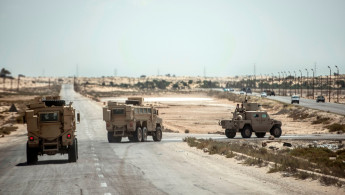Top Islamic State group leader killed in Egypt's Sinai: report
The high-ranking Wilayat Sinai figure was reportedly killed in a joint operation by the Egyptian military and local tribal forces.
2 min read
The true civilian toll of the Sinai insurgency is not known [Getty]
A leading member of the Islamic State group's Sinai affiliate was killed last week, according to Arabic media reports.
Salim Salmi Saeed Al-Hamadin was killed on Sunday evening in a joint operation by the Egyptian military and local tribal forces, local sources told Sky News Arabia.
Hamadin was a high-ranking member of the Wilayat Sinai extremist organisation responsible for the deaths of hundreds of civilians and soldiers in the restive North Sinai province, the sources added.
Described as one of the oldest and most dangerous militant groups in the region, Hamadin was reportedly arrested in connection with a series of 2004-5 bombings targeting tourist sites in the southern Sinai resort cities of Sharm el-Sheikh and Taba.
Hamadin was later released in 2011 and went on to join the insurgency that has devastated the northern half of the Sinai peninsula for nearly a decade.
The conflict between Egyptian forces and militants intensified after President Abdel Fattah Al-Sisi took power in 2013, followed by the formation of IS affiliate Wilayat Sinai (Sinai State) a year later.
Around 1,000 militants have been killed, according to Egyptian military figures.
The civilian toll of the conflict is not known however, as the Egyptian government has maintained a tight media blackout on independent reporting from the Sinai.
Human Rights Group has said Egyptian forces have likely commited war crimes against civilians over the course of the counter-insurgency campaign.
The New York-based rights organisation last week alleged Egypt had forcibly evicted thousands of Sinai residents, destroying more than 12,300 homes and nearly 15,000 acres of farmland between 2013-2020.
A 2019 report by HRW accused Egyptian forces of possible crimes against humanity such as the extrajudicial execution of suspected militants, airstrikes on civilian homes, enforced dissapearances and the arbitrary detention of thousands, including children. The claims were fiercely rejected by Cairo.
Follow us on Facebook, Twitter and Instagram to stay connected
Salim Salmi Saeed Al-Hamadin was killed on Sunday evening in a joint operation by the Egyptian military and local tribal forces, local sources told Sky News Arabia.
Hamadin was a high-ranking member of the Wilayat Sinai extremist organisation responsible for the deaths of hundreds of civilians and soldiers in the restive North Sinai province, the sources added.
Described as one of the oldest and most dangerous militant groups in the region, Hamadin was reportedly arrested in connection with a series of 2004-5 bombings targeting tourist sites in the southern Sinai resort cities of Sharm el-Sheikh and Taba.
Hamadin was later released in 2011 and went on to join the insurgency that has devastated the northern half of the Sinai peninsula for nearly a decade.
The conflict between Egyptian forces and militants intensified after President Abdel Fattah Al-Sisi took power in 2013, followed by the formation of IS affiliate Wilayat Sinai (Sinai State) a year later.
Around 1,000 militants have been killed, according to Egyptian military figures.
The civilian toll of the conflict is not known however, as the Egyptian government has maintained a tight media blackout on independent reporting from the Sinai.
Human Rights Group has said Egyptian forces have likely commited war crimes against civilians over the course of the counter-insurgency campaign.
The New York-based rights organisation last week alleged Egypt had forcibly evicted thousands of Sinai residents, destroying more than 12,300 homes and nearly 15,000 acres of farmland between 2013-2020.
A 2019 report by HRW accused Egyptian forces of possible crimes against humanity such as the extrajudicial execution of suspected militants, airstrikes on civilian homes, enforced dissapearances and the arbitrary detention of thousands, including children. The claims were fiercely rejected by Cairo.
Follow us on Facebook, Twitter and Instagram to stay connected





 Follow the Middle East's top stories in English at The New Arab on Google News
Follow the Middle East's top stories in English at The New Arab on Google News
![Israeli forces ordered bombed Gaza's Jabalia, ordering residents to leave [Getty]](/sites/default/files/styles/image_330x185/public/2176418030.jpeg?h=a5f2f23a&itok=_YGZaP1z)

